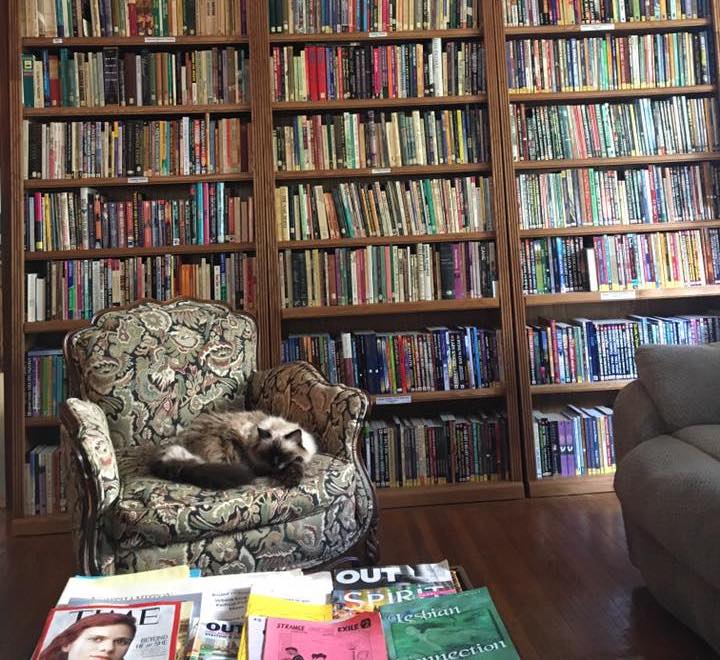by Samuel Edwards, 15S
For my summer internship funded through the Ethics and the Common Good Internship Grant, I worked at the Sexual Minorities Archives. The Sexual Minorities Archives is an archive based in Holyoke, Massachusetts that works on preserving LGBTQI+ history, as well as making this knowledge available to the public. A large part of the Sexual Minorities Archives is engaging the commons – that is, making queer history and knowledges available to a wider community outside of just academia. During my work at the Sexual Minorities Archives, my supervisor Ben Power would often tell me that every time I cataloged a book or sorted a subject file, that was a radical act because it was making visible LGBTQI+ histories that are all too often actively erased by a heteronormative and cisnormative society.
As someone who studies Queer Studies and History, this internship helped me see another facet of LGBTQI+ historical work; the side of the archive. Previously, I had engaged with history as a researcher in my classes, but actually being the person who worked to preserve primary sources was a brand new experience for me. In one instance, my supervisor and I rescued the Pride & Joy book store wall panels which were signed by several LGBTQI+ writers, activists, artists, and public figures. We saved these panels quite literally from being thrown in the trash, with the help of community members from the Pioneer Valley. This was then compiled into a blog post about the experience. These experiences have shown me how vital archives are, and also how often objects of historical importance are overlooked or discarded.
During my internship, I worked on an independent research project about a lesbian couple who lived in Middlefield during the 1930s, Amber Starbuck and Mabel Stevens. These women ran a health resort together and were pioneers as an early woman doctor, in the case of Amber Starbuck, and as an early woman taxi driver, in the case of Mabel Stevens. As part of this project, I went to see what once was their home in Middlefield and helped to write and compile a 43-page paper on the two of them and their lives. This paper will be the first known project on the queer history of this couple. Previously, oral histories of these two existed, but they were otherwise unknown to those outside of the Pioneer Valley. My work at the Sexual Minorities Archives will help shine light on this story for a wider audience. After my internship, this paper I created will be edited and used to create a Powerpoint to bring this story to a wider audience.
My work at the Sexual Minorities Archives expanded my views of LGBTQI+ history, and showed me that activism doesn’t always look like marching in the streets (although that is vital, too). Sometimes it can look like saving a piece of paper from the trash, or putting a book on a shelf and adding it to a catalog. Even though these things may seem simple, when put together over time, these actions send a powerful message about the importance of LGBTQI+ histories and lives. LGBTQI+ history is made all too frequently inaccessible, even to LGBTQI+ people. If it is available, the narrative we are given is often different than the reality, like the erasure of trans women of color such as Sylvia Rivera or Marsha P. Johnson in many narratives about the Stonewall riots. This means that LGBTQI+ people are alienated from our own history, leaving many of us feeling disconnected and alone. The work the Sexual Minorities Archives is doing directly challenges those erasures and silences, and keeps the narratives of LGBTQI+ lives in our own hands, rather than viewing it through a whitewashing, heteronormative and cisnormative lens.
Working at the Sexual Minorities Archives changed my perspective, and showed me the importance of both queer archiving and archiving in general. Since then, I’ve continued to explore the idea of archives through being the archivist for Hampshire’s Theatre Board, as well as put on a panel at the 9th Annual Five College Queer Gender and Sexuality Conference entitled, “Making Your Queer Archive Now!” I now serve on the Sexual Minorities Archives’ board as a director, because I couldn’t leave my work with the SMA only in the summer. All of this would not have been possible without my grant from Ethics and the Common Good.
Samuel Edwards is a Division III student at Hampshire College studying playwriting, queer studies, and mythology. His senior thesis “Caeneus” is a retelling of the Greek myth of Caeneus, a story about a transgender male hero.


